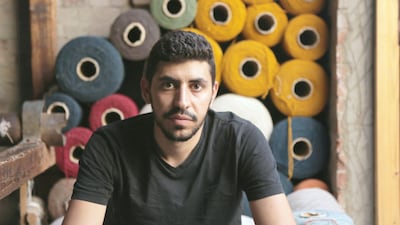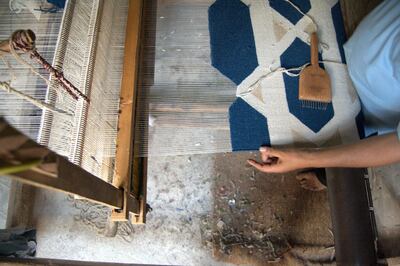Kilim, the Egyptian traditional art of hand-weaving, takes a craftsman in the Nile Delta village of Fowwa about one week and a kilo of sheep's wool to complete an artwork before it finds its way into the hands of customers from the US to Switzerland with the click of a button.
This intersection of heritage and technology is where Cairo-based e-commerce startup Kiliim sits. Co-founders Ibrahim Shams and Noha El Taher, the husband-and-wife team behind the venture, help preserve the intricate and ancient dying art of Kilim in the age of automation.
"The social aspect of our business is to try and save this craft from dying, empower craftsmen to resume practise and to ensure its sustainability," Mr Shams told The National in a phone interview.
Kiliim joins a growing number of start-ups in Egypt, the Middle East's fastest growing economy, as the country recognises the role of small and medium-sized enterprises (SMEs) in contributing to economic growth and reducing unemployment. Egypt is approaching the end of a three-year International Monetary Fund programme designed to help economic recovery after years of political and financial turmoil. Part of the reforms tied to the $12 billion (Dh44bn) loan is to help stimulate the private sector, particularly facilitating access to financing for SMEs.
“Egypt needs at least 700,000 new jobs annually to absorb its young and growing population, and that can only come from the private sector," according to the IMF.
The young duo behind Kiliim started their business after the birth of their daughter, Lina, when they were unable to find a handmade and authentic decorative item for her room that reflected their cultural heritage.
"We found a market gap for products that were local, with modern design, high-quality and available online," Mr Shams says.
The couple decided to combine Ms El Taher's graphic design experience with Mr Shams' corporate background to start the business in July 2016. Their first port of call was Fowwa, a village in the northern governorate of Kafr Al Sheikh that is the centre for kilim weaving in Egypt and home to thousands of workshops. With the advent of mass-produced, cheaper machine-made rugs and Chinese ornaments flooding the market, the industry began to decline from about 2000 craftsmen to 200 in the early aughts.
"There was a huge deterioration in the craft, the craftsmen were leaving it and there were pleas to the government to save it before it dies out," says Mr Shams.
The former Henkel executive took a train to Fowwa and started speaking to craftsmen to understand the situation on the ground before eventually finding a group of artisans that were optimistic about restoring the craft and in the hopes of reversing their fortunes.
Kiliim, which started out with one workshop with four people, now commissions three workshops with 16 craftsmen and hopes to add a fourth workshop to reach 21 artisans by year-end to cater to demand.
Demand has surged over the last three years, with the startup selling 3,500 pieces to about 2,000 customers in 33 countries, as sales grow 50 per cent year-on-year, according to Mr Shams.
The richly-coloured wool pieces range from $60 for bathmats, $130 for small runners and $1400 for rugs; prices vary depending on the size. While the debut collection was inspired by traditional motifs of oriental and geometric design, others have botanical themes with cypress trees and floral elements, varied textures that depart from the traditional flat-weave, and an Egyptian cotton collection.
Ms El Taher plays around with the design and colour palette to introduce contemporary patterns, depending on seasonal trends, though each piece retains its traditional technique.
Apart from the domestic market, the US is Kiliim's biggest market while it also exports to retailers in Germany, France, the UAE, Canada and Switzerland. Apart from its website, Kiliim also sells its products on US online marketplace Etsy and US wholesale platform Faire.
The business started off with a 50,000 Egyptian pound capital investment by the co-founders and managed to break-even within six months of operations, generating enough profits to re-invest into growing the company, according to Mr Shams.
The founders were approached by local and foreign investors but they declined as they wanted to grow the business at their own pace after escaping the hectic corporate jobs.
To access alternative funding sources, they applied for grants and entrepreneurship competitions. Winning first place at the MIT Arab Enterprise competition in 2017 has secured them a $50,000 prize used to fund participation at international trade shows and future growth plans.
Kiliim plans to open its first retail store by 2020 in Cairo and expand into other home textiles from bedding to throws, says Mr Shams.
Typical customers value the design and authenticity of hand-made crafts, a niche market ranging from newly-weds to people seeking to furnish their city or beach homes in the north coast.
The main challenge was to change the mindset of the artisans to commit to the design and colour palettes for consistency in quality and proportions, Mr Shams says.
Sourcing raw materials and gaining a foothold in the market were also hurdles along the way. The hike in fuel prices due to subsidy reforms have also increased the cost of raw materials and craftsmen's salaries but demand has remained relatively unchanged, he notes.
The devaluation of the Egyptian pound during IMF-led economic reforms were a boon when exporting kilim products.
"Our vision is to sustain the craft and people who work in it so that soon enough we will have a generation that learns the craft and sustains the industry," says Mr Shams.
About Kiliim:
Company/date started: Kiliim - July 2016
Founder: Noha El Taher & Ibrahim Shams
Based: Cairo, Egypt
Sector: E-commerce & handcrafted home decor
Size: 22 Employees
Stage: Bootstrap
Investors: Self funded
Q&A: Ibrahim Shams, co-founder of Kiliim
- Who first invested in you?
The company is self-funded by the co-founders
- What already successful start-up do you wish you had started?
I wanted to start an export company that targeted the African market
- What is your next big dream to make happen?
To make Kiliim a global leader in the handicrafts & home decor sector and have stores around the world showcasing our authentic, handcrafted Egyptian products
- What new skills have you learnt in the process of launching your start-up?
Bootstrapping, legal, brand positioning



